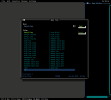I will have to learn these dark arts. When I had tried vim on a Fedora Plasma, whenever it opened some new file I freaked out and started typing dramatically until it brought me back. But now that I have to try things from a console, I think I have to settle my millenial head down and learn it.
I mean psh in kate I just press the open button and it opens in a background tab. Where is the open button on my vim?!?!?
I already get vastly more enjoyment out of using the FreeBSD than the Plasma with my non-existent skills, so learning shouldn't be that painful.
I'm sitting here chuckling a little bit. The old guys here that started out with VT100s, got giddy when they graduated to a VT220, almost had heart attacks at a "X-terminal" device (DEC, Sun, whatever) probably all have vi keystrokes embedded into muscle memory.
What should a text editor do? Allow a user enter and format text. Been done for years with old fashioned ttys and markup language (I believe that is how K&R originally sold Unix to Bell Labs). All the newfangled GUIs and IDEs simply make it easier to access features. Why do I need to move a mouse, press a button, scroll a menu to open a file? (One of my biggest issues with Windows, trying to remember which gui gives me the data from an ifconfig command)
It's like IDEs for programming: bundle the makefiles, ctags but how do I configure it to format code the way I want? Emacs I think is a reasonable compromise between ed/vi and full blown GUI based things. I can run emacs in a term window and my keystrokes still work. I can run a windowed version of emacs (used to be called xemacs) and my keystrokes work. I can also use Emacs as an "almost os" because I can read mail, drop to a shell, traverse tags, a whole lotta stuff.
For the record, I've used lots of different IDEs (free and paid) over my career, never felt comfortable. Term windows, makefiles, ctags always just work. Quick changes vi is easiest, if I'm spending all day looking at code (existing code base of 10s of thousands of line) emacs is a bit easier for me.
So, text editors (including writng code), it pays to be flexible and have a comfort level with the old standards like vi (because sometimes thats all you get) to at least open file, edit file, save file, exit.
Just my opinions, agree, disagree, all good.


